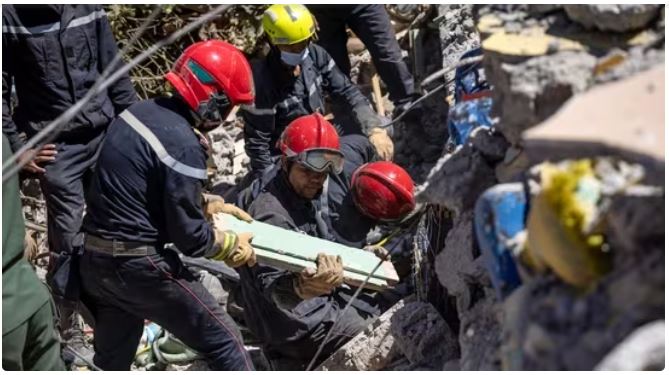Villagers wept for lost relatives in the rubble of their homes on Monday as the death toll from Morocco’s deadliest earthquake in more than six decades rose to more than 2,800 and rescuers raced against time to find survivors.
Search teams from Spain, Britain and Qatar were joining Moroccan rescue efforts after a 6.8 magnitude quake struck late on Friday in the High Atlas Mountains, with the epicentre 72 km (45 miles) southwest of Marrakech.
State TV reported the death toll had risen to 2,862 with 2,562 people injured. Rescuers said the traditional mud brick houses ubiquitous in the region reduced the chances of finding survivors because they had crumbled.
Among the dead was 7-year-old Suleiman Aytnasr, whose mother had carried him to his bedroom after he fell asleep in the living room of their home in a hamlet outside Talat N’Yaaqoub, in one of the worst-hit areas. He had been about to start a new school year.
“As she came back, the earthquake happened and the ceiling was destroyed and fell on him,” said Suleiman’s father, Brahim Aytnasr, whose eyes were red from crying. He had spent Monday trying to salvage items from the debris of his house.
In the village of Tagadirte, where few buildings had been left standing, 66-year-old Mohamed Ouchen described how residents pulled 25 people alive from the rubble in the immediate aftermath of the quake.
One of those rescued was his own sister.
“We were busy rescuing, because we didn’t have tools, we used our hands,” he said. “Her head was visible and we kept digging by hand.”
Footage from the remote village of Imi N’Tala, filmed by Spanish rescuer Antonio Nogales of the aid group Bomberos Unidos Sin Fronteras (United Firefighters Without Borders), showed men and dogs clambering over steep slopes covered in rubble.
“The level of destruction is … absolute,” said Nogales, struggling to find the right word to describe what he was seeing. “Not a single house has stayed upright.”
Despite the scale of the damage, he said rescuers searching with dogs still hoped to find survivors.
I am sure that in the coming days there will be some rescues, we think that there may still be people in the collapsed structures, that there may have been pockets of air, and as I say, we never give up hope,” he said.
DAMAGE TO HERITAGE
After an initial response that was described as too slow by some survivors, search and rescue efforts appeared to be speeding up on Monday, with tent camps appearing in some locations where people were preparing for a fourth night outdoors.
A video filmed by Moroccan outlet 2M showed a military helicopter flying over an area close to the epicentre, dropping sacks of essential supplies to isolated families.
With much of the quake zone in hard-to-reach areas, the authorities have not issued any estimates for the number of people missing.
The harm done to Morocco’s cultural heritage has been emerging gradually. Buildings in Marrakech old city, a UNESCO World Heritage Site, were damaged. The quake also did major damage to the historically significant 12th-century Tinmel Mosque.
Residents in Tinmel, a remote village close to the epicentre where 15 people were killed, said they had been sharing food, water and medicine, but desperately needed tents and blankets to shelter from the cold mountain nights.
AID EFFORT
It was the North African country’s deadliest earthquake since 1960, when a tremor was estimated to have killed at least 12,000 people, and the most powerful since at least 1900, according to the U.S. Geological Survey.
In a televised statement on Sunday, government spokesperson Mustapha Baytas defended the government’s response, saying every effort was being made on the ground.
The army said it was reinforcing search-and-rescue teams, providing drinking water and distributing food, tents and blankets.
A major road connecting the High Atlas Mountains to Marrakech was gridlocked on Monday evening as heavy vehicles and volunteers carrying relief supplies headed towards some of the hardest hit communities in remote areas of the mountains.
Moroccan volunteers and civilians, aided by some foreigners, helped direct traffic and clear the road of rock debris.
Prime Minister Aziz Akhannouch told local media the government would compensate victims, but gave few details.
The Moroccan government wants to proceed with International Monetary Fund-World Bank annual meetings scheduled for next month in Marrakech, two sources familiar with the planning said.
Morocco has accepted offers of aid from Spain and Britain, which both sent search-and-rescue specialists with sniffer dogs, and from the United Arab Emirates and Qatar. State TV said the government might accept relief offers from other countries later.






